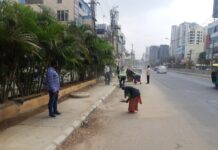National Campaign on Dalit Human Rights (NCDHR) is celebrating their 20 years of championing Dalit rights in India. Prior to 1998, Dalit rights was considered as social evil and discriminatory practices, while not given due recognition from the human rights perspective. NCDHR emerged as platform which initiated a Pan India perspective of Dalit rights during its initiation of recognition within the Human Rights paradigm. In 1998, 25 lakh signatures were collected from the community including community leaders and academia, demanding effective implementation of constitutional safeguards for the protection and promotion of the Dalit Rights and total elimination of untouchability.
“Over the past 20 years NCDHR has emerged as a formidable resistance movement, defending the rights of our community. It is an incredible moment in history for our partners and associates to reflect on the journey thus far and innovate new strategies to combat the divisive and casteist forces” said Mr. Paul Divakar, co-founder of NCDHR.
In 2001, when there was not sufficient response and effort by the government, the issue was raised in the global level at World Conference Against Racism in Durban, South Africa. Over 200 delegates from different streams of life, including Dalit Rights activist, Human Rights activist, parliamentarians, academia, artists, solidarity groups among others participated in the conference to highlight the issue of Dalits. The three main outcome of the conference was guiding the countries to report on the specific themes of African American Issue, Palestine Issue and Dalit Issue in South Asia.
During last 20 years, NCDHR has worked towards deepening the structures of Dalit Rights. NCDHR was involved in training over 2000 Dalit Human Rights Defenders in the usage of SC/ST (PoA) Act 1989, building capacities of Dalit organisations and advocates; sensitizing the Judges through National Judicial Academy.
Prof. Vimal Thorat, co-founder of NCDHR unanimously reiterate the relevance and importance of locating the leadership, articulations and demands of Dalit women within the larger anti-caste movement. “We feel NCDHR placed this in context several years ago by launching AIDMAM to ensure Dalit women remain in the centre of all the interventions ”
NCDHR has prioritized the importance of Gender rights through All India Dalit Mahila Adhikar Manch [AIDMAM] and Economic rights through Dalit Arthik Adhikar Andolan [DAAA] including land rights with Civil and Political rights through National Dalit Movement for Justice [NDMJ] for ensuring overall approach for rights and entitlements. In 2004, NCDHR has initiated National Dalit Watch [NDW] for mapping the inclusion of Dalits in disaster risk reduction.
NCDHR facilitated the state partners to come together and advocate for the amendment in the SC/ST (PoA) Act, which was finally adopted in 2015. With its partners in 22 states, NCDHR has worked towards better implementation of the SCC/STC for rights and development of the SC/ST communities. As a result of our interventions,the government to release Rs. 4596.08 crores for scholarships for Dalit students in higher education.
Both Mr. Henri Tiphagne and Mr. Martin Macwan, co-founders of NCDHR felt that in the current challenges political climate, NCDHR has played a crucial role in protecting rights of Dalit Human Rights Defenders. “ In celebrating the 20 years of its existence, NCDHR must innovate and build on the experiences towards enabling strategic actions”, they said.
Dalit Rights has seldom got any support or recognition from the wider society at large in the country, where over 201 million people are discriminated in the basis of their caste, even today.
NCDHR stands relevant in the today’s environment as there is an absence of anti-discriminatory law, which has resulted in constant targeting of violence and discrimination against Dalits. In education, Dalits children faces discrimination from teachers and other children as well as lack of access and availability of scholarships and hostels. In employment, where jobs are been outsourced to the private sector, there is a significant gap in availing jobs for these communities. In housing, Dalits are still segregated not only in villages, but even in cities. Violence against Dalit women are steadily on the increase, with over 25 thousand cases were registered in 2016-17 alone, while over 40 thousand cases were registered under SC/ST (PoA) Act. In Budgets, there is a gap of INR 86796 crores in 2018-2019, for ensuring development of the communities.
Ms. Asha Kowtal, General Secretary of AIDMAM and Dr. Rameshnathan V. A., General Secretary of NDMJ added their views on current relevance of NCDHR on Dalit Rights . “NCDHR has evolved in addressing the contemporary issues of young Dalit women leadership, discrimination in primary and higher education and other issues as we go along!”
Internationally, caste issue comes under the terminology of Discrimination based on Work and Descent (DWD). In India and South Asia, Dalits are considered as the major groups under DWD, but globally there are many groups in Africa, Asia, Latin America and Europe; who faces similar forms of exclusion and structural discrimination. NCDHR with its global interventions is trying to bring these communities together towards addressing the issue of DWD globally.









